Frequent sweating in newborns should be a cause of concern for parents, because if the child’s head is sweating, especially in sleep, it can be a consequence of the development of rickets, in order to rule out this terrible disease, it is recommended to see a doctor as soon as possible.
Causes of sweating in a child
Newborn babies are subject to a variety of diseases. Having found the first signs of possible anomalies, it is necessary to take cardinally quick measures to exclude the likelihood of their development. One of the alarming symptoms may be that the child's head sweats a lot.
This may be due to a variety of reasons:
- the simplest explanation is that the baby's sebaceous glands are not yet developed, therefore, they do not work correctly. While the body as a whole responds adequately to changes in temperature and environmental conditions, at night the scalp does not have time to process and remove excess fluid, so the head sweats. This leads to the accumulation of excess moisture, especially in sleep, when the head of the baby lies on the pillow, and hair only aggravates the accumulation of sweat;
- another natural explanation for excessive sweating may be excessive activity of the child, especially if not only the head but also other parts of the body are sweating. Spending most of the time in motion, the newborn loses a lot of energy, which leads to active perspiration;
- if the baby sweats for the most part only when he sleeps, first check the temperature in the room. When the environmental conditions are normal, most likely it is caused by a malfunction of the body. The most correct reasons are: lack of vitamin D, the development of rickets, the detrimental effect of medications (analgesics, antibiotics and some vitamins have such an effect);
- uncomfortable clothes can also lead to the fact that the child will sweat a lot, in the first place the head suffers. To avoid such troubles, try to dress the baby according to the weather - do not wrap him up, remember that the optimum temperature in the room is about 24 degrees;
- head sweating in a dream in older children may occur due to hormonal imbalance, this common problem transition age, i.e. 14-17 years.
Thus, to determine exactly why a child’s head is sweating, solely on external signs It is impossible, but an experienced doctor will immediately tell you about the possible risks by examining the behavior of the child, its appearance, the development of organs and the skills obtained. The fact that the crumb often sweats when sleeping and awake will not necessarily be the result of a dangerous disease, but as a prophylaxis the pediatrician will most likely prescribe vitamin D2 and D3 drops in drops - this is a harmless supplement, and it is especially relevant in the cool season when children are rarely in the sun.
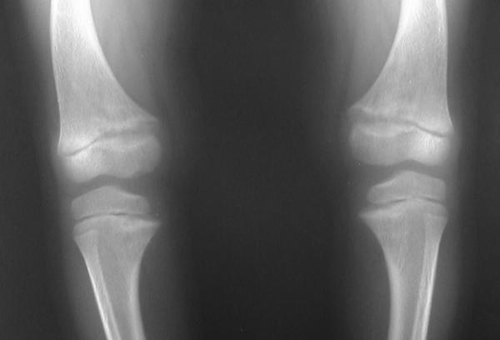
Signs of rickets in a child and how to deal with it
The most unpleasant reason for excessive sweating of the head is the development of rickets. This is a dangerous disease of babies. early agewhich without proper treatment can lead to disastrous consequences.
In addition to sweating in a dream, rickets has other symptoms:
- the segment of the head, on which the crumb lies most often, when it sleeps, looks heavily wiped;
- the skull assumes a non-standard elongated shape, the temporal bones are deformed;
- springs on the head begin to soften;
- decreased body tone, muscle mass relaxes, and the child becomes sluggish and inactive;
- swelling tummy;
- the position of the limbs changes - they can be bent and turned out in different directions;
- the emotional state of the baby is disturbed - he often cries in his sleep, is naughty during the day, gets scared of familiar things and becomes overly anxious.
To make an accurate diagnosis, it is necessary to conduct appropriate tests - blood from a vein will be required. Only on the basis of the results can the doctor deliver the final verdict. Treatment of rickets in advanced forms will not bring a special result, so the best option would be to prevent the occurrence of the disease with regular intake of vitamin D2 or D3. This will prevent the development of deformations of both external and internal organs, besides, it will save your baby from excessive sweating of the head and body.
Vitamins, however, can bring considerable harm to health, since their excess is also unacceptable for a developing organism, as well as a disadvantage. The optimal proportion for a newborn is 1 drop per day, but how to give it?
There are several ways to take vitamin D:
- drip crumbs in her mouth - a dangerous option. The dispenser often fails, so instead of 1 drop, 2 or even 3 can pour out. Of course, nothing terrible will happen at once, but a regular increase in the amount of the product is quite dangerous;
- you should not offer medicine from a spoon either, since a drop will spread over the surface, and the child is unlikely to receive the amount of the drug he needs;
- drip on - perfect. First, you see the end result, and secondly, the child will eat a full drop of vitamins.
Regular intake of vitamins and other supplements important for the growth and development of the child’s body (with a doctor’s prescription) will help to maintain the health of the newborn at the proper level and protect the baby from possible unpleasant diseases.
Many believe that sweating the head of a child is a clear sign of rickets.
This may be so, but it should also be known that in young children, sweating is a completely normal physiological process. The sweat glands in babies begin to function in the third or fourth week from birth, although they are still not fully developed and do not work quite adequately. The temperature of the child's body reacts programmed ways, for example, when the cold vessels are narrowed. The baby is cold and sweating a lot. About the normal development of the sweat glands can only speak at the age of five or six.
Causes of child sweating
If the fact that a child is sweating in a dream has led you to believe that a child has rickets, you should visit the doctor, of course, but first make sure of additional symptoms, for example, this disease is also characterized by whims, restless sleep, crying for no reason and often changing mood.
A child's appetite decreases, excessive sweating of palms, feet and, of course, of the head is added, his head becomes bald. These signs must be detected on time, because at the next stage bone deformities begin. And the doctor will additionally refer you for blood and urine tests.
Rickets is characterized by the smell of ammonia from children's urine, a decrease in the amount of phosphorus in the blood, and calcium can be increased. In the urine, there is an increased phosphorus content. usually consists of using products that include vitamins D2 or D3. For preventive purposes and in accordance with the instructions, these drugs can be given to a child without consulting a doctor. Usually the need for their use occurs in autumn, in cloudy weather, and ends with warm and sunny spring days. Such prevention is desirable for all children up to the age of three years, most of all this applies to weak and premature babies.
Abundant sweating of the child’s head may be provoked by other factors:
- vitamin D deficiency,
- colds
- heart failure,
- hyperthyroidism,
- use of a number drugs and some others.
Baby activity
If the medical examination showed that the child is completely healthy, you will have to admit that your baby is just overly active. At the same time, look around just in case and pay attention to the child’s environment, take into account the room’s microclimate, possible stuffiness, excessive humidity, these are all factors of excessive perspiration. A common and repeated mistake is the excessive wrapping up of your children. The child should be dressed for the weather and only slightly warmer than an adult. Excessive sweating during sleep can be caused by bedding. And not only too warm. For example, a duvet or pillow is able to cause an allergic reaction, and provoke excessive sweating.
In adolescence, a child already has an adult sweating regimen, since at about thirteen the axillary sweat glands are activated. Increased sweating at this age may indicate hormonal disorders.
In addition, excessive sweating is emotional or simply inherited.
With vegetative disorders nervous system The babies also sweat a lot, but not all night, but only when they fall asleep, and they wake up with a dry head. With the formation of the central nervous system, and this comes with age, will disappear by itself.
There are cases of sweating when breastfeeding, and if at the same time the child has no other warning signs, it means that the baby is just working diligently.
We should not forget about the correct temperature and humidity in the nursery. You can not overheat the child. Moreover, the kids tolerate the coolness more easily than the heat.
What is the reason for this feature? Is it dangerous? What actions to take? Should I worry?
Such questions immediately arise in the thoughts of young parents, if they first encountered such a problem. First of all, we note that sweating is a normal and standard phenomenon.
Every normal person sweats.
This is a physiological phenomenon, which is designed to excrete toxins, toxins, cool body temperature, prevent tissue from drying out.
Domestic reasons why a child's head is sweating
You are sure that your baby is absolutely healthy! But the head is sweating? There may be several reasons. Many of them are domestic and have no relation to terrible diseases.
In particular:
- . For caring moms and dads, it seems that the baby is so tiny, it is constantly cold. So, you need to wear on him, as much as possible warm things. Even if it's summer and the apartment is warm. What if it blows? Pediatricians recommend to approach the issue of clothing wisely, not to muffle the baby, especially if he moves a lot.
- . Picked up a trivial ORZ, which is not as scary as parents think. Sweating in this case - the protection of the body. So, the baby is struggling, his organs and receptors are working in a normal normal mode. Harmful substances are removed from the body, which, most likely, provoked the disease.
- Baby is excited or upset. Then he, too, can sweat profusely. If the baby has suffered a lot of emotional stress, there is nothing surprising in excessive sweating. This is a completely normal reaction of the body. Observe the child: as soon as it calms down, sweating, like a hand will remove!
- If the baby is not getting enough sleep or is experiencing a state of overworkhe sweats too. Follow the regime of the day, whether it is built and debugged? Make sure that the child falls asleep at the same time, take food and play at certain hours, make time for walks.
- Drugs prescribed by a doctor may cause sweating in a child.. Sometimes it is written in the instructions for use of the drug. Read the instructions carefully so that next time you can understand what is happening with the baby.
Diseases in which the child's head is sweating, and this is normal
The baby's head sweats when he gets sick. In some cases - this is not a reason for panic. Namely:
- cold;
- allergy;
- neurosis;
If the baby has a little cold, the body will try to cope on its own. He will produce sweat to expel the disease in the truest sense of the word. You should not worry if the child’s body temperature does not rise above 38 degrees.
The child may be allergic to down and feathers in the pillows, mattress filler and much more. Food allergies are common. Maybe sweat is just an allergic reaction? To understand this, you need to completely eliminate allergens. If the baby continues to sweat (it is the head that is sweating), get a pediatrician consultation.
Baby is experiencing stress. Because of this, the head sweats. Why is the child nervous? What worries him? Create a comfortable environment so that the baby feels safe, then his head will stop sweating.
When teeth are cut, the baby behaves restlessly, because the head and sweats. Do not worry, it will pass quickly!
In what cases is a child's sweaty head - anxiety, additional symptoms for an emergency visit to a doctor?
Sometimes the fact that a child's head sweats can be a reason not only for anxiety, but also for an urgent visit to a doctor.
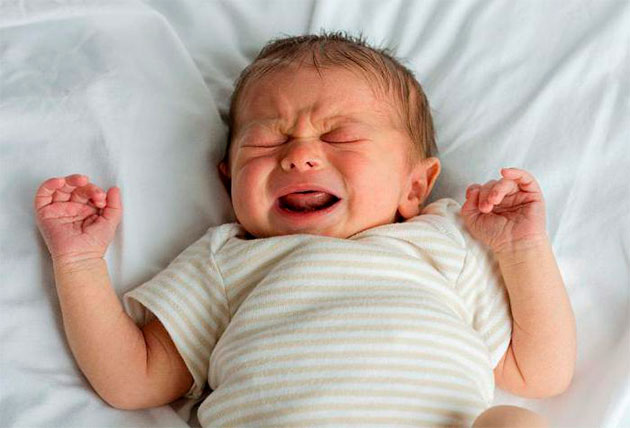
Does the child have a head sweat, but is the body dry? Perhaps he has:
- virus;
- heart disease;
- disruption of the thyroid;
- endocrine disruption.
To identify such failures in the children's body at home is impossible. Need professional help. Do not make diagnoses yourself, in any case do not treat the child without interfering with the process of a qualified doctor. This can lead to sad consequences, death!
To understand whether the baby suffers from serious illnesses, the doctor will prescribe additional tests and research. Mom will be given directions for a blood test, Urine, feces (in some cases), an ultrasound of the abdomen, head, and heart. Only by the results of all tests can a diagnosis be made, treatment prescribed.
To which doctor should I go if my child has a head sweating?
You have excluded all domestic causes, the baby has not caught a cold, his teeth are not being cut, there is no allergy? Then - urgently to the doctor? To which? To begin with - to the district pediatrician. He will examine the baby and tell you how to proceed. It may be necessary to refer to:
- (to confirm or deny diabetes);
- an oncologist (he will indicate the presence or absence of tumors (malignant or benign);
- tB specialist (exclude or confirm);
- (examines the body for the presence of infections - hepatitis, malaria, influenza and others);
- a neurologist (helps you understand whether your child is suffering from depression, schizophrenia, autism, and other dangerous mental illnesses);
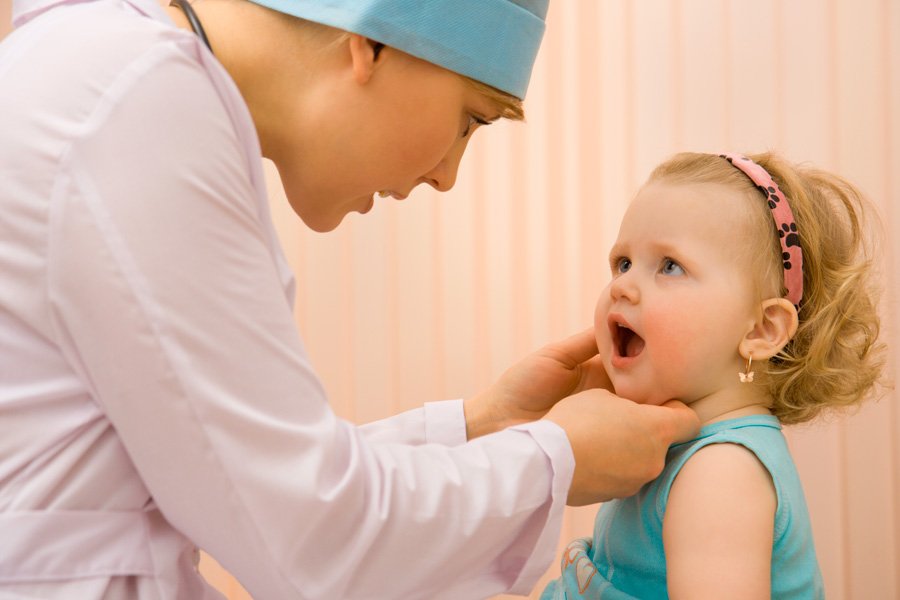
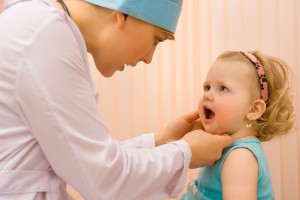
- toxicologist (if there was a poisoning);
- dermatologist (if sweating is associated with a skin disease).
Opinion of Dr. Komarovsky
The famous pediatrician, the guru of modern moms and dads, does not bypass the topic of excessive sweating of the head in young children. Here is what he says on this occasion:
- excessive sweating often lies in the room too hot for the baby. It is necessary to ventilate the room, moisten it, sweating immediately disappears. The normal temperature in the baby's room is from 20 to 22 degrees Celsius;
- sometimes excessive sweating is an individual characteristic of the organism;
- weak nervous system. Even if the baby is in a comfortable environment, he may get nervous because of poor sleep or a loud, sharp sound;
- o says not only increased sweating in the head, but also a number of other signs, there and baldness, and constant anxiety, and lack of appetite, thickening of the bones;
- sweating of the head in the daytime - normal, at night - cause for concern, it is better to consult a doctor;
- baby activity often leads to sweating. If a baby with tension sucks the breast, the nipple or the bottle, then it will certainly sweat in the head area.
What could cause a child's sweaty head? Effects
If the baby's head sweats for domestic reasons, it can lead to. These are rashes in the form of a red rash, often inflammations resemble water bubbles. We must fight them. Otherwise, because of the constant itch, the baby will feel bad, will begin to cry more often than it will upset parents.
If the head sweats due to serious illnesses, the consequences can be dire. In particular, rickets leads to curvature of the bones. Deformation can not be corrected or turned into five. Diabetes mellitus can lead to death, like other serious illnesses, such as thyroid problems or heart failure. Character of discharge is important - do they have a smell, color, do they cause inconvenience to a baby?
Remember, you should not panic, but to brake, too. Are you worried? Consult a doctor, show your baby to a doctor. Better worry than not to watch and not to notice the problem in time. Most of the childhood diseases are easily treatable if you start taking the right drugs on time.
Self-treatment of the child is excluded. Do not treat your baby’s delicate skin with deodorants or antiperspirants - this can lead to even greater, even tragic consequences!
VIDEO The baby's head sweats
VIDEO Increased sweating in babies
Children under the age of 4-5 years, sweat more often, more intense. This is explained by the imperfections of the nervous system and the functionality of the sweat glands. Perspiration in infants is considered normal. But still there are several factors indicating the development of serious pathologies, where sweating is one of the symptoms. So why does a baby's head sweat? When should parents seek medical help?
Causes of excessive sweating in infants
After 3-4 weeks, as a baby was born, the sweat glands begin to work in his body. And since they are still poorly developed, the child will sweat heavily in his sleep, with GW or during the game - this is a feature of the human body. At the age of 4-5 years old, the thermoregulation of the child’s body is getting better, and sweating becomes moderate. If excessive sweating continues, even if the child has reached the age of 5, there is a reason for seeking qualified help.
A baby can sweat a lot at night or during the day because of:
- banal dressing up: fearing not to catch a cold baby, parents often wear it too warmly, as a result of which the crumb overheats and sweats profusely;
- irregular temperature and humidity of the air in the house: the optimal temperature in the room - 18-20 0 C, and humidity - up to 60%;
- a recent illness with fever - after the illness the child stops sweating after 3-4 days;
- excessive activity: all children under 3 years old sweat a lot during active games, physical education;
- excitement or overexcitement;
- genetic inheritance;
- allergies: at night, the infant and the older child should sleep in underwear made from natural fabrics — any synthetic underwear (bedding or bedding) can cause severe allergic reactions.
If the baby is sweating heavily, pay attention to the smell of his sweat - if he is absent, then this phenomenon is not dangerous. If you have a specific smell, you need to contact your pediatrician.
Other causes of excessive sweating can be:
- functional disorders of the thyroid gland, heart, vegetative nervous system;
- lack of vitamin D;
- the reaction of the child's body to drug therapy or cold;
- individual physiology of the child;
- fatigue and agitation;
- allergic reaction to animal hair, pollen, medicines, hygiene products, etc .;
- impaired stool;
- phenylketonuria (the child will sweat a lot, while his sweat has a pronounced "mouse" smell);
- lymphatic diathesis;
- cystic fibrosis (the content of chlorine, sodium increases as a part of sweat);
- rickets.
Parents should be alerted by too thin or sticky, thickish consistency sweat with a strong odor - this is a good reason to visit a pediatrician or a neurologist.
Why does the baby’s head sweat when feeding or sleeping?
When HBG, many mothers watched as the baby covered with copious sweat in the process, and the baby’s head could sweat. As a rule, this phenomenon is considered to be the norm: for a child HB - hard physical labor. We can not even imagine how difficult it is for a baby to get food from her mother's breast! Especially clearly sweating occurs when the milk in the mother’s breast is low.
In addition, with HB, the baby can sweat a lot due to a recent illness or an excessive temperature in the room. In addition, holding the baby in her arms, the mother's body heats him even more. Therefore, always try to dress the baby in accordance with the temperature in the room.
At night, a child may sweat for various reasons that are affected by age.
| Child's age | Causes of sweating at night |
| 7-8 months | Development of rickets, overwork from excessive activity |
| 12 months | Reaction to down pillows and blankets (they overheat children's body), allergic reactions to synthetics, fluff, wool, diabetes |
| 2 years | High humidity in the room, its coarseness; recent cold |
| 3 years | Synthetic, lymphatic diathesis |
| 4 years | Overweight, problems with the child’s vascular system, long-term medication, tuberculosis, excessive emotionality, nightmares |
So that the child could fall asleep at night quietly and at the same time his head did not sweat, choose pajamas from natural fabrics, give preference to hypoallergenic pillows, natural bed linen. If the child is easily overexcited, go for a walk before bedtime, instead of cartoons, read fairy tales or listen to calm music.
Sweating of the head, as a symptom of the development of rickets
Do not ignore the symptom of sweating of the head. The most terrible disease, which she can signal, is rickets. The development of the disease is more susceptible to one-year-old children, and if you do not start treatment on time, rickets causes serious health problems.
Along with the fact that the child sweats heavily at night or during the day, other symptoms of the disease appear:
- due to a lack of vitamin D, internal organs and the skull are deformed, which becomes oval due to changes in the frontal and temporal portions;
- on the back of the head fall out and stop growing hair;
- the kid ceases to aktivnichat, his muscle tone decreases;
- the child becomes aggressive, fearful, whiny, begins to fall asleep poorly;
- the limbs of the child are bent;
- tummy hardens and swells;
- softened springline.
The most effective treatment for rickets is its prevention. It consists in:
- prophylactic intake of vitamins D and D 3;
- regular performance and therapeutic physical culture;
- daily walks;
- personal hygiene;
- proper nutrition;
- massages and bathing.
If your child began to sweat heavily both day and night, do not postpone the visit to the specialist: timely response to the problem will help to avoid unwanted complications with the baby’s health.
What to do to the child's head is not sweating?
If, as a result of the examination, the infant is ill, the doctor will definitely prescribe an adequate treatment for the disease as a whole, and not for sweating as a symptom. If the baby is healthy, you can reduce the sweating of the head, following these tips:
- Provide in the child's room temperature and humidity of air within 18-20 0 С and 60%, respectively.
- Wear a baby in clothes made of natural textiles - in children's wardrobe there is no place for synthetics.
- Wear warm clothes to your baby only when needed and according to the weather.
- Watch that the child does not overheat (in hot weather, let us drink plenty of fluids, bathe more often, do not wrap up in numerous clothes).
- Limit the use of sweets, exclude salty and spicy dishes from the children's diet.
Remember that sweating is a human feature. Someone sweats more, someone less. And if the head of your child is periodically covered with perspiration, but all the rules mentioned above are followed, then this is most likely an individual feature of your child’s nervous system, and this phenomenon does not pose any danger. But if sweating is accompanied by other symptoms, which were mentioned earlier, immediately go to a pediatrician or a neurologist - experts will help to understand the problem and solve it.
Almost every mother begins to worry when she notices that her baby’s head is sweating while sleeping. Moreover, increased sweating is manifested in the baby on the head, and the body remains dry. Why does a baby's head sweat at night? The reasons for this phenomenon may be several:
- vitamin D deficiency;
- viral infection;
- drug intake;
- heart failure;
- pathology of the thyroid gland;
- endocrine diseases.
Rickets
If a child has a sweating head, and it manifests itself during sleep, first of all it is necessary to suspect the development of such a disease as rickets. It manifests itself most often in children under one year, since it is during this period that the infant's body experiences a tremendous burden, because in the first year its growth almost doubles. The main cause of rickets is calcium and phosphorus deficiency. The baby’s systems are not yet fully mature, so even a small lack of vitamins and essential trace elements have a great effect on the body.
Premature babies suffer from rickets most often. Also more prone to this disease are children who are bottle feeding. Sometimes the cause of calcium deficiency is the syndrome of impaired absorption in the intestines, often developing as a result of lactase deficiency. Influencing the development of this syndrome can be intestinal infections, celiac disease. Hereditary diseases, liver and kidney problems also lead to rickets.
In addition to excessive sweating during sleep, signs of a lack of vitamin D may include:
- reduced appetite;
- disturbed sleep;
- baldness of the neck.
These are the symptoms that are observed in children under one year of age when rickets develop. In this case, you should contact your pediatrician, who will prescribe the appropriate therapy.
Endocrine diseases
Excessive sweating of the head with dryness of the rest of the body can occur in a baby with diabetes. But sweating is manifested not only when falling asleep and during sleep, but also during the period of vigor. Accompanying symptoms of this disease is severe thirst, frequent urination, weakness. With the appearance of these signs should refer to the endocrinologist.
Disorders in the thyroid gland (hyperthyroidism) also leads to sweating. Hyperhidrosis occurs in a child both during the period of activity and when he is sleeping.
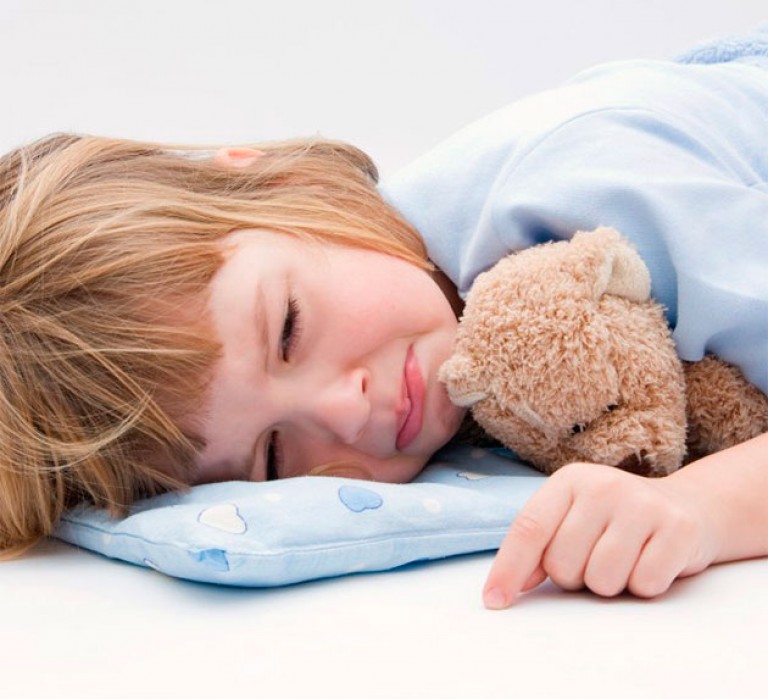
Heart pathologies
If a child sweats heavily when he is asleep, as well as he has heavy breathing, coughing, this may be signs of heart disease. In addition, with heart diseases, weight loss, cyanosis of the nasolabial triangle, and increased fatigue are observed. If your baby has these symptoms, you should be examined.
Infectious diseases
Excessive sweating during sleep is possible with diseases associated with the penetration of viral infections into the body. This may be an acute respiratory disease, influenza, various intestinal infections. In addition to sweating, the body temperature usually rises, the child refuses to eat during the daytime, plays a little. Proper treatment, selected by a pediatrician, helps to cope with the infection. The problem of sweating in a dream goes away soon after treatment.
Temperature conditions
If the examination prescribed by the pediatrician shows that the baby is healthy, the problem of sweating during sleep may mean that he is very active during the period of vigilance. You should also pay attention to the microclimate of the apartment. Irregular ventilation, stuffiness, high humidity may well contribute to this reaction of the body during sleep. The best temperature in the room where the baby rests, is the range from 18 to 22 degrees. Humidity should not exceed 60%.
If the child is sleeping, it does not need much to wrap. Constant opening, sweating can mean that the child is just hot. In children up to one year, the functions of the body's thermoregulation are still imperfect, and many parents are prone to hyper-care, including over-wrapping their child. An important measure in the prevention of unpleasant symptoms is the choice of clothing. It should be made from natural fabrics. Synthetic things may well disrupt the process of thermoregulation.
Other reasons
Duvets and pillows can cause allergic reactions, which can also strongly provoke sweating of the head during sleep. In this case, it is better to replace them with pillows with bamboo fiber or other hypoallergenic fillers.
Increased sweating may be signs of disruption of the autonomic nervous system. In young children, especially up to a year, it is still being formed. With age, this problem usually disappears, and hyperhidrosis, manifested in a dream, disappears.
When taking certain medications, you may also experience sweating of the head during sleep. This is a side effect that most often passes after the abolition of such therapy.
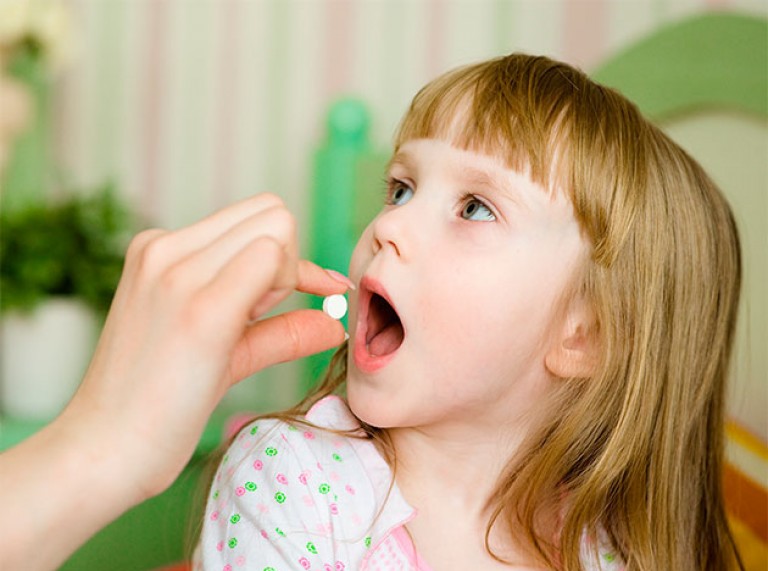
If the head of the child is sweating in a dream, do not panic, but you should carefully observe his condition. Irritability, refusal to eat, weight loss, anxious dreams can be symptoms of rickets, endocrine system malfunctions, heart pathologies. Consultation with a pediatrician and appropriate examinations will help identify problems in a timely manner.